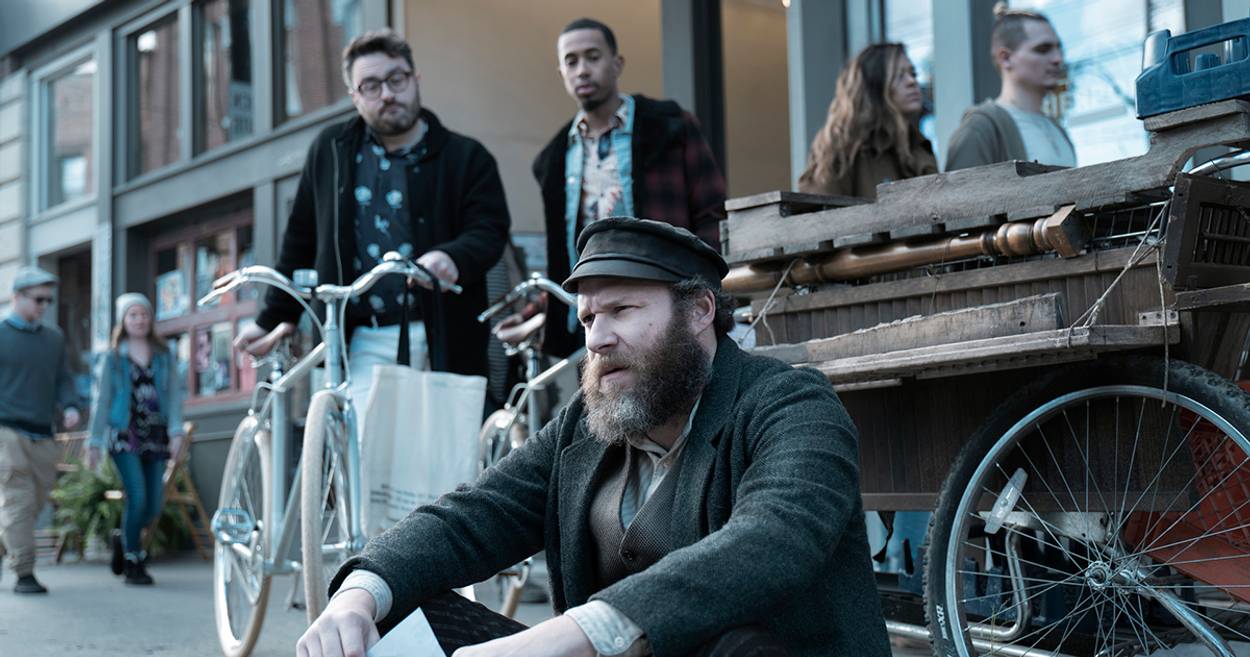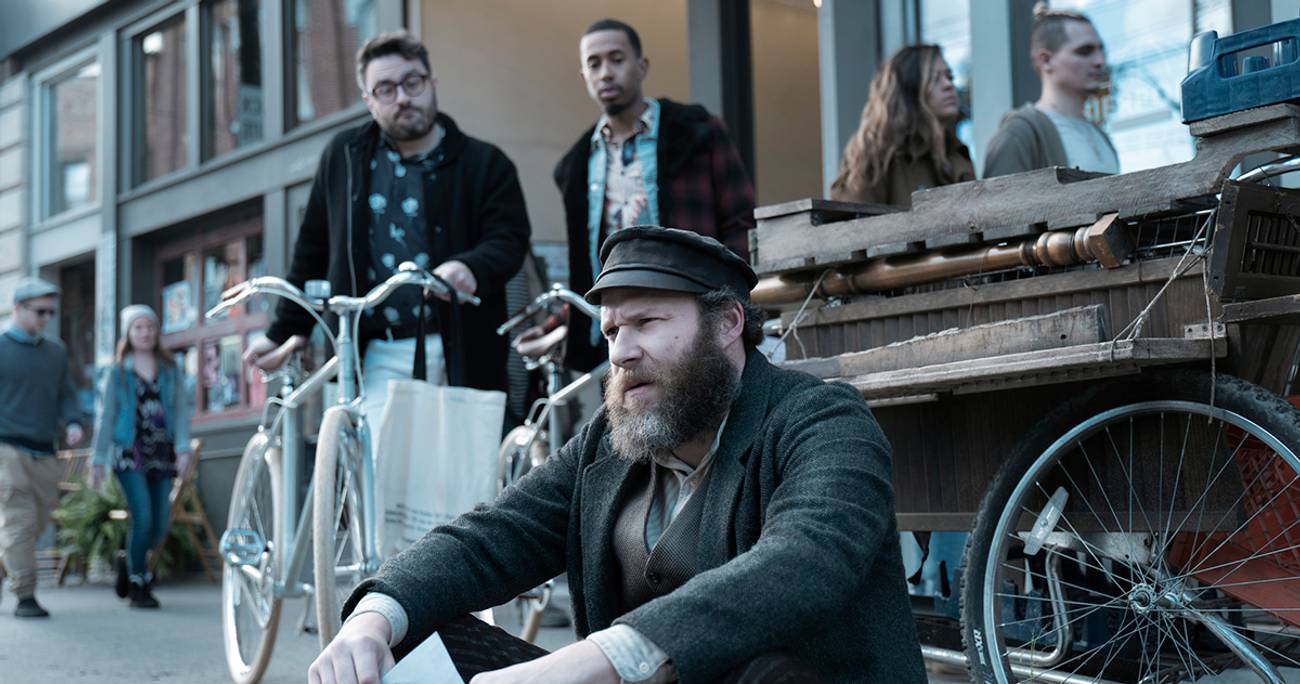American Pickle
Seth Rogen commits Jew-on-Jew violence in a subversive new film




Seth Rogen’s new movie allows him to talk to himself, Jew to Jew. The conflict between a truculent primitive proste yid (a bearded Rogen in a Tevye cap) and his sad sack assimilated descendant (Rogen untucked and unshaven) is encapsulated in the title An American Pickle.
Based on Simon Rich’s novella “Sell Out,” An American Pickle is an exercise in Jewish magic realism, positing an early-20th-century East European immigrant who, working in a Brooklyn pickle factory, falls into a vat of brine and freg nisht is preserved for a hundred years, reemerging unaged into present-day Brooklyn where he is taken in by his great-grandson.
“Sell Out,” which was originally published in The New Yorker over four issues during the winter of 2013, is in large part a self-directed satire of millennial angst, narrated in amusing Russian-inflected English by disinterred Herschel Rich. The protagonist, named for his creator Simon Rich, is a self-absorbed script doctor with his own brownstone and a gentile girlfriend, Claire, who is getting a doctorate in sociology at Columbia University.
The fictional Simon is mildly intrigued by his aboriginal ancestor, who like him is 27, but, after several disasters (notably one that involves a ruckus at a celebrity Lower East Side club) he grows increasingly irritated. Indeed, annoyance turns to rage when by dint of his stubborn, irrational immigrant energy, his great-great-grandfather becomes a success marketing artisanal pickles to Brooklyn hipsters and foodies. That at one point Claire leaves Simon to hang out with Herschel adds an additional Oedipal wrinkle, although the punchline is a cynical salute to the American dream.
As written for Rogen (one of the film’s producers), Rich’s script keeps the story’s voice, premise, and location (Pittsburgh providing an effective stand-in for Williamsburg). However, he reorients the conflict between Old and New World Jewish manhood, renaming Simon Rich, Ben Greenbaum, eliminating the shiksa girlfriend, heightening the generational conflict, and giving Herschel, who’s become a great-grandfather, a more developed backstory complete with pogrom and subtitled Yiddish dialogue.
A ditch digger in the impoverished shtetl of Schlupsk, Herschel meets and marries the equally destitute Sarah (Sarah Snook) in a pauper’s wedding disrupted by marauding Cossacks who, in a comic stand-in for the Holocaust, massacre half the town. The couple immigrates to America where Herschel gets a job smashing rats in the Capital [sic] pickle works, there to be entombed and exhumed. Rather than a successful screenwriter, Ben is a nebbish freelance app developer who for five years has been working on an algorithm that rates companies in terms of their ethics.
Herschel is disappointed by Ben who has only a cursory interest in his roots. Pickled in tradition, the great-grandfather is obsessed to the point of madness with the American family he founded but never saw—running amok when he discovers that Sarah’s grave in rundown, nearly abandoned beys oylem on the Brooklyn-Queens cemetery belt is being overshadowed by a monster ad for flavored vodka. Herschel’s attack on the “Cossack poster” lands both him and Ben in jail and creates an estrangement that is solidified when Herschel’s artisanal pickle stand gets precisely the sort of internet and venture capital support that Ben has failed to realize.
An American Pickle derives most of its tang from the Herschel and Ben scenes. (In one superfluous but charming bit of business, Ben puts on an oldies station and shows Herschel how to dance to the 1960 chestnut “Stay.”) Yiddish popular culture has a tradition of comedy in which assimilated Jews disguise themselves as their traditional co-religionists, largely for purposes of ridicule. Predicated on this premise, Avram Goldfadn’s mistaken identity farce Tsvey Kuni-Lemels is a founding work of Yiddish theater. An American Pickle, however, is more of an internal dialogue.
In some movies, Yiddish actors played old-fashioned Jews for dramatic as well as comic effect. The Austrian silent film Ost und West (East and West) has Jacob Kalich’s young Hasid cut off his payes and secretly go modern for love of Jewish flapper Molly Picon (who at one point does her trademark yeshive-bokher impersonation). The Yiddish talkie Zayn Waybs Lubovnik (His Wife’s Lover) allows the great comic Ludwig Satz to play a worldly matinee idol, like himself, who wins a bet by successfully courting a young sweatshop seamstress in the guise of a drooling but pious man. An American Pickle stands this situation on its head as bearded Rogen uses assimilated Rogen as his stooge.
As a former stand-up comedian, Rogen may identify more with transgressive Lenny Bruce than offensive Don Rickles, which is to say, his outrage has an element of social criticism. Although not as deftly un-PC as Sacha Baron Cohen, for whom he wrote Ali G material, Rogen does turn Herschel into an unfunny (consequently very funny) insult comedian: “You are stupider than a Polish person and they are the stupidest,” he scolds Ben who, recognizing Herschel’s uncensored naïveté, dupes him into opening a Twitter account to publicize his pickle business.
Rogen’s most resonant joke is that, secure in his prejudices, outspoken Herschel is impervious to the niceties of the culture wars. Canceled by offended Brooklyn hipsters and defended by Kanye West for his tweets, Herschel is so without tact that he can be easily prompted to articulate the ultimate desecration and open himself up to deportation as an illegal alien. As the judge puts it, “the abomination known as Herschel Greenbaum will never wreak havoc on our great land again.” For some, the same is true of Rogen.
As satire, American Pickle is more sweet than sour. Nevertheless, in promoting the movie the star put himself in another sort of pickle.
Rogen’s career has not been without controversy—not least in that he describes his politics as left wing, identifies as a working-class Jew, and is a public supporter of BLM as well as marijuana reform. He might even be considered a Hollywood provocateur. His breakthrough performance in the blithely sexist hit Knocked Up (2007) can be construed as a comic Nazi nightmare, as the slovenly troll who seduces and impregnates Katherine Heigl’s Aryan goddess.
The less ingratiating, more politically pungent Observe and Report (2009), written and directed by Jody Hill, cast Rogen as an angry, self-important, racist, bipolar knucklehead mall cop. (Given the movie’s expression of irate proletarian populism it deserves another look in 2020.) Albeit a mess, Rogen’s facetious superhero movie The Green Hornet (2011), which he co-wrote with his childhood friend Evan Goldberg, satirized the entire comic book tendency, giving him another doggedly unattractive role, as self-entitled white guy lording it over more talented female and Asian lackeys.
The Interview (2015), a hit-and-miss satire of North Korean dictator (and future Trump bud) Kim Jong-un, which Rogen and Goldberg co-directed, found its target. The movie provoked an international crisis, prompting a barrage of North Korean threats and likely a series of cyberattacks on Sony Pictures. But, for some, even this outrage pales beside the interview Rogen gave Marc Maron’s podcast WTF in late July.
Ostensibly promoting An American Pickle, Rogen made light of the indoctrination he received as a young Jew attending day school and Labor Zionist summer camps. Egged on by Maron, Rogen (who as recently as 2014 signed a Hollywood-generated statement in defense of Israeli action in Gaza), humorously articulates a radically Diasporist and “100,000% Jewish” position. “We’re Jews—we can say whatever we want,” he reassures Maron who anticipates the response to come. “If anyone can say whatever they fucking want about this shit, it should be two famous Jewish people. If anyone’s getting rounded up first, it’s our fucking asses.”
Jewish ambivalence toward Israel is nothing new, although no one will ever confuse the flippant Rogen-Maron schmoozefest with Philip Roth’s brilliant, multifaceted Operation Shylock. Still, as with Herschel Greenbaum’s colorful characterizations, the podcast occasioned a tweet storm and scores of articles in the Jewish press, a half dozen in the Forward alone.
While some sounded the alarm, warning that Rogen spoke for many young Jews or calling for more nuanced instruction in Zionist history, the Israeli political philosopher Shany Mor dropped the hammer with a furious open letter headlined, “Dear American Jewish Boys: Please find another outlet for your Oedipal rage. Signed, Israeli Jews.”
Calling out Rogen and Maron for their ignorance of Israeli history and politics, Mor suggested that, rather than kvetching about Israel, they might better address themselves to the deficiencies in their American education. “Was the version of American history you got at age 12 particularly critical?” (Point taken, although Rogen is Canadian. Still, the Vietnam War triggered a youthful rage and mass disillusionment that, now elderly, continues to this day. But that’s another story.)
It’s telling that Mor characterizes Rogen, 38, and Maron, 56, as boys. (To judge from his photographs, Mor’s age would probably fall somewhere between, although he is, of course, immeasurably more adult in his language, attire, and general seriousness.) Rogen and Maron may be clowns but Mor’s scolding serves as a reminder that much Jewish American popular culture is predicated on the battle between parents and children and most specifically fathers and sons. The Jazz Singer, in which a cantor’s son, from a long line of cantors’ sons, defies his dad to go on the vaudeville stage, may not be the touchstone it once was but the dynamic still exists. Are we not told that Israel is the “land of your fathers”?
If anything, An American Pickle sublimates Rogen’s “Oedipal rage.” The Hasidim who—were An American Pickle at all naturalistic—Herschel would have had to encounter in Brooklyn are the movie’s structuring absence. After all, Herschel (like the Satmar) is a Jew who identifies with tradition rather than Zion and his arrival thus nudges his great-grandson Ben to resolve an Oedipal conflict that has nothing to do with Israel, Palestine, or Benjamin Netanyahu.
If the most politically subversive aspect of An American Pickle is its sly identification of Herschel with Donald Trump by way of Jackie Mason, the schmaltziest thing is its generational reconciliation. Ben makes his heritage tour to Shlupsk to find himself as a Jew (and a mourner) but the more cheerful punchline has the two Rogens watching Yentl on TV, pondering the mystery of American Jewish identity—a suitable coda to a movie that, like the Streisand statement, involves dress-up, disguise, and Brooklyn.
J. Hoberman was the longtime Village Voice film critic. He is the author, co-author, or editor of 12 books, including Bridge of Light: Yiddish Film Between Two Worlds and, with Jeffrey Shandler, Entertaining America: Jews, Movies, and Broadcasting.